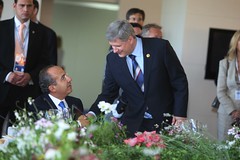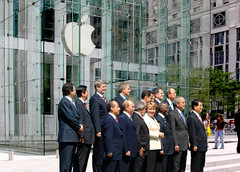Despite the economic downturn, thanks to transportation costs due to high fuel prices, and higher farming costs, thanks to climatic changes, the costs of food has sky rocketed since this time last year.
With more people in financial distress and the increases in food costs, the number of undernourished people worldwide has jumped significantly, all while donations to c
 Image via Wikipedia
Image via Wikipedia
Donations to food aid programs is at a 20-year-low, the same report out of the UNWFP says.
The UNWFP is facing its own serious cash crunch, having only secured $2.6 billion in funding for its 2009 budget of $6.7 billion.
Donations to major food banks around the world are down, so to are corporate donations to these food banks and related charities.
"This comes at a time of great vulnerability for the hungry," the agency said.
"Millions have been buffeted by the global financial downturn, their ability to buy food is limited by stubbornly high prices. In addition, unpredictable weather patterns are causing more weather-related hunger."
Famines caused by droughts, floods and poor growing conditions have severely increased the number of starving people worldwide, particularly in seven of the poorest countries on the planet.
Sixty-five per cent of the world's hungry live in only seven countries: India, China, the Democratic Republic of Congo, Bangladesh, Indonesia, Pakistan and Ethiopia, according UNWFP.
Urban sprawl in major cities worldwide is also contributing to the global food crisis, as more farms are sold off to developers, who in turn pave over the once fertile land, expanding the concrete jungles of suburbia.
This in turn promotes global warming, as those who move into homes on the once fertile farmlands now must commute greater distances to get to work.
And because of increased carbon dioxide emissions from the extended commutes, planetary temperatures increase, dramatically changing global weather patterns – which leads us back to the global food shortage.
It is a never-ending cycle of interdependence, which we human beings haven’t quite got just right.
We’re still trying to figure out our place in the great ecosystem of the world. Hopefully we’ll get it before we wipe ourselves off this planet – forever.
![Reblog this post [with Zemanta]](http://img.zemanta.com/reblog_b.png?x-id=c0cb8002-a43e-4469-b156-34ea69d72f2c)


![Reblog this post [with Zemanta]](http://img.zemanta.com/reblog_b.png?x-id=d2e4b84f-d4fe-4585-a2e8-106d1e5c5d3d)







